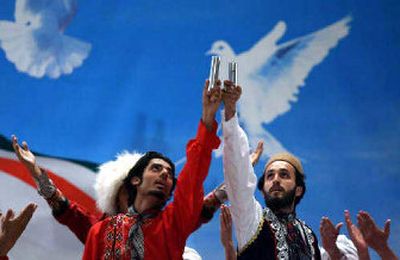Iran claim accelerates the debate

LONDON – Iran’s announcement on Tuesday that it has enriched uranium for the first time marks a small but significant advancement of its potential to build a nuclear bomb in the next five to 10 years, according to experts in nonproliferation.
Iran’s claims, which the experts regarded as credible, could dramatically complicate efforts by Europe and Russia to reach a diplomatic solution while lending a new sense of urgency to hawks in the United States and Israel pressing to keep military options open.
Having cleared a major initial hurdle in the nuclear-enrichment cycle, Iran next must devise ways of lengthening production, duplicating machinery and dispersing facilities around the country to make it far more difficult for a military strike to wipe out the program, experts said. They insisted that Iran has many major challenges ahead, and that much negotiating time remains.
“As always, the different factions (in Washington) will use it to justify their existing positions. The vice president and his hawks will use it to show that the Iranian program can’t be stopped through diplomatic means and, therefore, their preferred option of a military strike is the only option,” said Joseph Cirincione, director for nonproliferation at the Carnegie Endowment for International Peace.
He added that pragmatists in the State Department and Pentagon are likely to argue strenuously in favor of continued diplomacy because “any military strike on Iran will accelerate the program, not delay it.”
In a speech Tuesday, Iran’s president, Mahmoud Ahmadinejad, declared that his country has “joined the club of nuclear countries” after enriching uranium “on a laboratory scale” of sufficient purity to supply a nuclear power station, the official Islamic Republic News Agency reported.
The president repeated his claim that Iran’s nuclear program is for peaceful purposes only, and he criticized the world’s nuclear powers as being stuck in “the mentality of 50 years ago,” thinking “that they can change world political, cultural and economic equations in their own favor by stockpiling weapons of mass destruction.”
He added, “The Iranian nation does not take its might from nuclear arsenals, and the origin of our nation’s strength lies in its deeply rooted religious faith.”
White House spokesman Scott McClellan said the statements “continue to show that Iran is moving in the wrong direction.”
The U.N. Security Council has given Iran until April 28 to halt its nuclear-development activities or face undefined international sanctions. Iran has rejected the threats, insisting that it has a right under existing treaties to resume peaceful nuclear research, including uranium enrichment.
The Bush administration argues that Iran’s hard-line religious leadership is too dangerous to be trusted. The New Yorker magazine reported this week that the administration has drawn up plans for a military strike that could include the use of nuclear “bunker-busting” bombs to destroy underground facilities.
The White House dismissed the report as exaggerated and insisted it is committed to reaching a diplomatic solution with Iran.
Iran still faces many major hurdles in its nuclear program, said Gary Samore, a specialist in Iranian nuclear development and vice president of global security at the Chicago-based MacArthur Foundation.
Tuesday’s announcement “is a big development,” he said. “It’s credible to me that they were able to get the facility up and running long enough to produce … (tiny amounts of) enriched uranium.”
However, “centrifuges have to operate continuously to produce any significant quantities. You’ve got to be able to demonstrate that you can run it continuously for months.” Setbacks, failures and breakdowns are likely. “They have a long way to go” before they can attain sustainable, large scale production, Samore added.
“Don’t panic,” Cirincione said. “The Iranian program is still at the very early stages.”